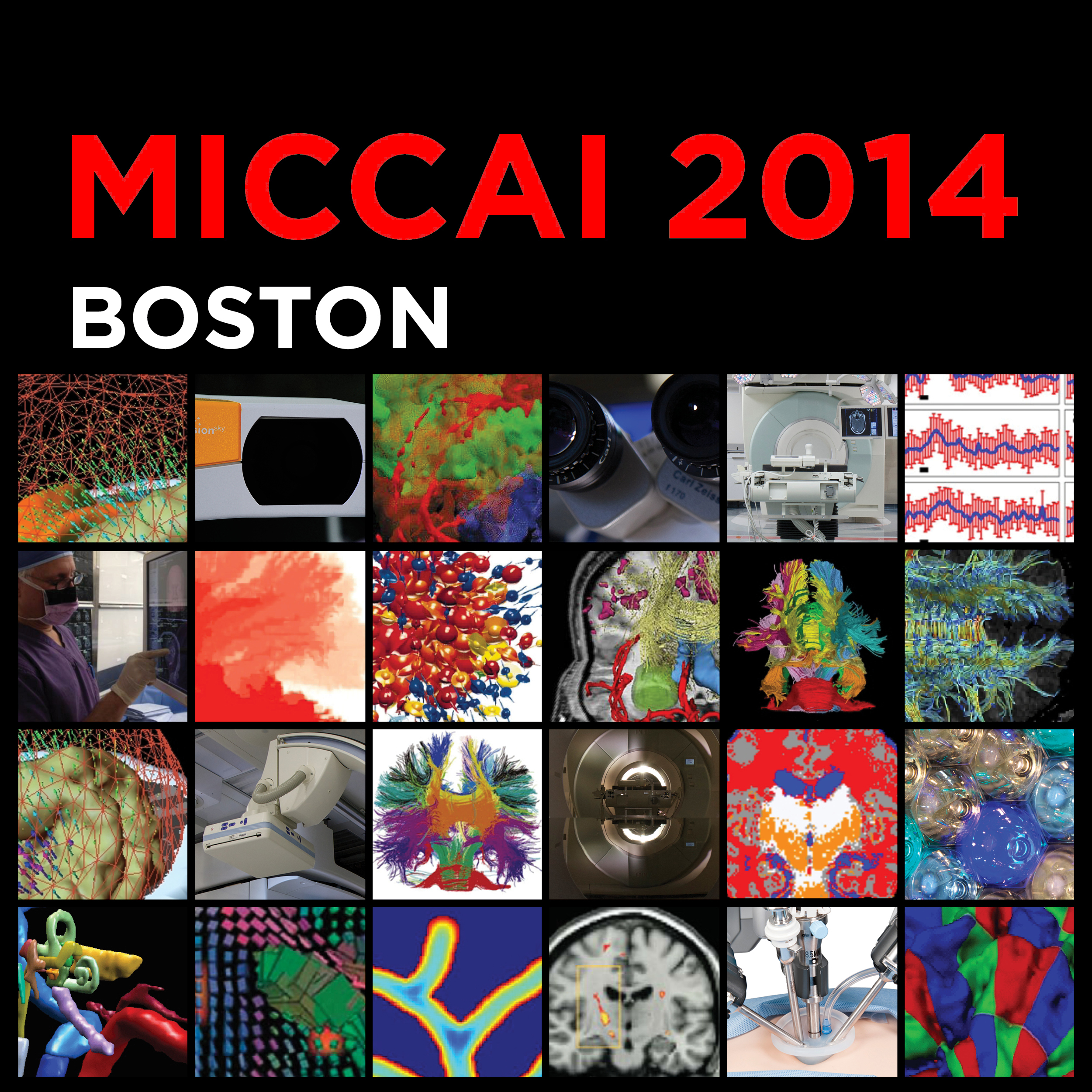
CDMRI'14
MICCAI 2014 Workshop on
Computational Diffusion MRI
|

|
|
|
|
|
Welcome and introduction |
8:00-8:15 |
Challenge | SPARC dMRI | 8:15-10:00 |
| Full details here | |
Coffee Break and Posters |
10:00-10:30 |
Keynote Lecture | Carl-Fredrik Westin, Harvard University, USA |
10:30-11:15 |
| Non-conventional diffusion MRI | |
Oral Session I: |
11:15-12:00 |
| 1.1 |
Vector weights and dual graphs: an emphasis on connections in brain network analysis |
|
Peter Savadjiev et al |
|
Brigham and Women's Hospital, Harvard Medical School, USA |
| 1.2 |
Rich club network analysis shows distinct patterns of disruption in frontotemporal dementia and Alzheimer's disease |
|
Madelaine Daianu et al |
|
University of Southern California, United States |
Lunch and Posters |
12:00-13:30 |
Oral Session II: |
13:30-15:00 |
| 2.1 |
Multiple stages classification of Alzheimer's disease based on structural brain networks using Generalized Low Rank Approximations (GLRAM) |
|
Liang Zhan et al |
|
University of California, Los Angeles, USA |
| 2.2 |
The added value of diffusion tensor imaging for automated white matter hyperintensity segmentation |
|
Hugo Kuijf et al |
|
University Medical Center Utrecht, The Netherlands |
| 2.3 |
Algebraic connectivity of brain networks shows patterns of segregation leading to reduced network robustness in Alzheimer's disease |
|
Madelaine Daianu et al |
|
University of Southern California, USA |
| 2.4 |
Fiber Bundle Segmentation Using Spectral Embedding and Supervised Learning |
|
Dorothee Vercruysse et al |
|
KU Leuven, Belgium |
Coffee Break and Posters |
15:00-15:30 |
Oral Session III: |
15:30-17:00 |
| 3.1 |
Atlas-Guided Global Tractography: Imposing a Prior on the Local Track Orientation |
|
Daan Christiaens et al |
|
KU Leuven, Belgium |
Q-space reconstruction & post-processing |
| 3.2 |
Magnitude and complex based diffusion signal reconstruction |
|
Marco Pizzolato et al |
|
Athena Project-Team, Inria Sophia Antipolis-Mediterranee, France |
| 3.3 |
Motion is Inevitable: The Impact of Motion Correction Schemes on HARDI Reconstructions |
|
Shireen Elhabian et al |
|
Scientific Computing and Imaging Institute, University of Utah, USA |
| 3.4 |
Joint Super-Resolution Using Only One Anisotropic Low-Resolution Image per q-Space Coordinate |
|
Vladimir Golkov et al |
|
Technical University Munich, Germany |
Closing Remarks |
17:00-17:15 |
| 1 |
Bilateral Filtering of Multiple Fiber Orientations in Diffusion MRI
|
|
Ryan Cabeen et al
|
|
Brown University, USA
|
| 2 |
Diffusion propagator estimation using Gaussians scattered in q-space
|
|
Lipeng Ning et al
|
|
Harvard Medical School, United States
|
| 3 |
Dictionary Based Super-Resolution for Diffusion MRI
|
|
Burak Yoldemir et al
|
|
University of British Columbia, Canada
|
| 4 |
Looks Like You Learned: Detecting and Recognizing Training-Induced Changes in White Matter Architecture
|
|
Thomas Schultz et al
|
|
University of Bonn, Germany
|
| 5 |
An Analytical 3D Laplacian Regularized SHORE Basis and its Impact on EAP Reconstruction and Microstructure Recovery
|
|
Rutger Fick
|
|
INRIA, France
|
| 6 |
Diffusion-Map: A Novel Visualizing Biomarker for Diffusion Tensor Imaging of Human Brain White Matter
|
|
Mohammad Hadi A'arabi et al
|
|
Tehran University of Medical Sciences, Tehran, Iran
|
| 7 |
Parcellation-Independent Multi-Scale Framework for Brain Network Analysis
|
|
Markus Schirmer et al
|
|
King's College London, UK
|
| 8 |
A Multi-Parametric Diffusion Magnetic Resonance Imaging Texture Feature Model for Prostate Cancer Analysis
|
|
Farzad Khalvati et al
|
|
Sunnybrook Research Institute, Canada
|
| 9 |
Predicting poststroke depression from brain connectivity
|
|
Jhimli Mitra et al
|
|
Australian E-Health Research Centre, CSIRO CCI, Australia
|
|